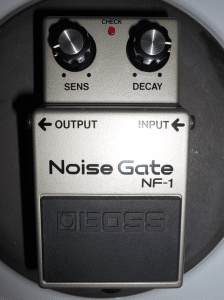What is Gating?

Sometimes, when you’re mixing and mastering, you’ll have a track with background noise that you want to cut out. For example, if you were recording a live drum kit and positioned a mic on the toms, you would likely have the snare and cymbals bleeding into that mic’s recording as well.
If you try compressing the track with the background noise, it would only bring out the unwanted sounds more. And if you were to reduce the gain of the track so that the background noise became imperceptible, you’d likely deflate the sounds you do want in there. This is where gating comes in handy.
Gating is the process of using a dynamic threshold as an on/off trigger. The simplest form would be with gain, where everything below a certain decibel level would automatically have it’s gain set to zero. This is called a noise gate and is used often by producers to not let background sounds get through to the mix.
One of the most popular uses of gating is with electric guitar recordings, where effects pedals can cause a significant amount of noise in the track. By setting up a noise gate with the threshold just above the decibel level of the unwanted noise, the track is automatically cleaned up.
Another popular use is with drums, as mentioned before, where the sounds of other pieces in the kit inevitably bleed into each mic.
Like a compressor, gating typically has three controls: threshold, the dynamic point at which the effect is triggered; attack, how fast the effect is applied; and release, how fast the effect is turned back off when the track falls back below the threshold.
A gate can be applied to most effects, such as reverb or delay, causing them to be triggered only by the louder parts of the track. Many producers have found creative ways to play with such applications, like adding delay to singer’s voice when she hit’s the penultimate notes of a song.
Gating is a fundamental tool for mixing and mastering that has virtually unlimited creative applications, though generally the most popular use is with a noise gate. Practically all major DAWs come with built in gate effect. So next time you’re mixing a track and want to cut out some background noise, or add reverb to the louder parts of a track, try setting up a gate.




